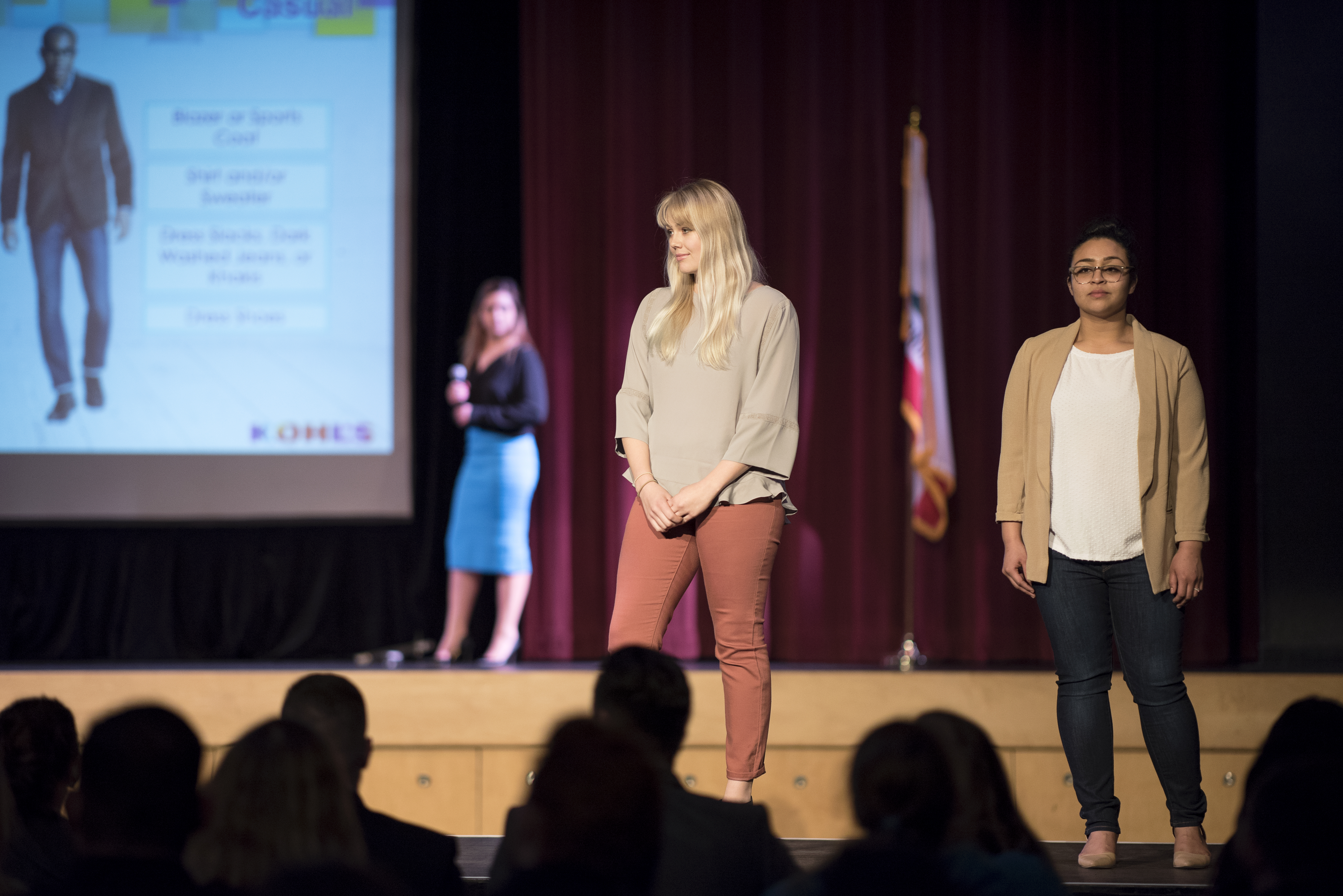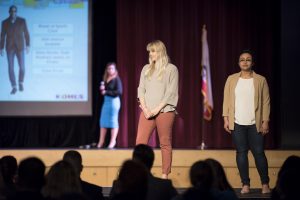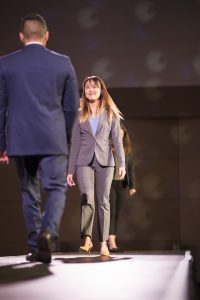Dress for Success Event Tackles Professional Dos, Don’ts

Two College of Business students model attire that’s appropriate for a casual business event. (Jessica Bartlett / Student Photographer)
Do tattoos, argyle socks, or distressed jeans belong in the workplace?
Those were just some of the professional attire dilemmas that were tackled during Dress for Success, a combination fashion show, business mentoring session, and comedy hour that turned the Bell Memorial Union Auditorium into a catwalk and drew an audience of about 100 students who were eager to learn what to wear to job interviews.
Richard Jones—a district manager for Kohl’s in the Bay Area who has seen many a professional image faux pas over the years—served as emcee for last week’s event, which was sponsored by CSU, Chico business student organization Pi Sigma Epsilon and Kohl’s.
With the help of 13 volunteer student models, Jones showed the audience several examples of acceptable professional looks, assisted by a co-emcee, College of Business junior Madelynn Martinez.
The students strutted in outfits to a pounding techno beat to illustrate the correct clothing combinations to wear to casual, business casual, or business professional events.

(Jessica Bartlett / Student Photographer)
Depending on the company, “there’s a wide spectrum of what people wear, there’s a wide spectrum of how people expect you to look when you come to an interview, and there’s a wide spectrum of how you should look when you go to a company function,” said Jones. “Doing a little bit of research on the company can save you some embarrassment, and also put you in a situation where you can be successful during the interview,” he told the audience.
Dress for Success was especially timely for the students, most of them juniors and seniors, who are nearing graduation and plunging into the job interview season.
The event occurred two days before the Business, IT and SAP Career Fair and really helped set the tone of “this is how you can look successful,” said Brittany Fortune, a finance and marketing professor who was involved in planning the Dress for Success show. “There’s a huge need for this right now,” she said.
Kaelani Johnson, a junior and business major, said she thought the event “was pretty cool. It was good to see a professional’s point of view on what you should wear to an interview.”
She took note that the women student models wore blazers and neutral colors, even for business casual settings. “I just didn’t think that I should wear a blazer in that case. My opinion of business casual was not the same as their opinion—that you shouldn’t wear bright colors and you want to wear neutrals,” she said.

(Jessica Bartlett / Student Photographer)
Business suits and power pumps weren’t the only topics. Students heard about the importance of punctuality at job interviews and even learned a quick fix for sweaty palms.
Jones’ top peeves at job interviews—cell phones, fragrances, and jewelry.
During a job interview, he said, never pull a cell phone out and start taking notes. Instead, he stressed, “Go old school and bring the pen, bring the portfolio.”
Jones also cautioned students to go easy with fragrances, which can trigger allergies in some people.
Jewelry is another area where he’s seen people go wrong.
Jones recalled one interviewee who wore a prominent bracelet that “kept banging against the desk the entire time we were talking. It got to a point where all I could think about was, ‘stop banging the jewelry on the desk!’ I really wasn’t paying attention to anything he said.” His advice: leave any standout jewelry at home.

(Jessica Bartlett / Student Photographer)
Jones also addressed the workplace appropriateness of tattoos and piercings by urging students to first research the company.
At Kohl’s, for example, “we don’t care whether you have a tattoo or not, it just has to be covered when you are coming into the work environment,” he said, adding, “We’re pretty flexible with piercings, too: nose, lip, eyebrow, and ears.”
As to determining whether a garment is too tight, Jones said, decide how comfortable you’d feel wearing it in front of the CEO. “That’s going to be a good guide,” he noted.
Not all of his advice to students related to appearance.

(Haley Traynor / Student Photographer)
Jones gave a tip about the best time to show up for an interview. “Typically, we say that being 15 minutes early is really being on time for any business event, especially an interview. [That] not only shows respect for the people who are doing the interview with you, it also allows them—if they’re running ahead of schedule—to start your interview a little bit earlier, and keep them on pace for their own day.”
To answer a question texted from a member of the audience to a message screen on the stage, Jones spoke about important factors to consider when negotiating a salary.
When the talk turns to salary, students should keep in mind that their “total package” could come with other benefits including personal time off, bonuses, stock options, and merit increases, he said. “Have them talk about it from a cash-out perspective versus a base salary. There are a lot of other things you should be negotiating,” said Jones.
And Jones’ simple sweaty palm cure? Pat on some Purell and let your hands dry before entering the interview room.


